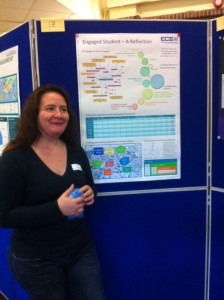22nd January: one day, three WSI events!
January 14, 2015
by Lisa Harris via WSI | WSI

1. Annotating and editing video for supporting blended and online learning 22nd January in 34/1020. Food will be available from 12 and the talk will take place from 12.30pm to 1.30pm In this informal WSI lunch Professor Mike Wald from ECS and his team will discuss work on a WSI Research Collaboration Stimulus Fund Project focused around “Synote”. This suite …
Self-employment and the feminist future – the women’s cooperative WeiberWirtschaft
December 16, 2014
by Silke Roth via Work Thought Blog

Since the beginning of the economic crisis in 2008, there has been a significant increase of women’s self-employment. However, women are still under represented among the self-employed. Obstacles to female entrepreneurship include lack of capital and affordable office space, in particular for small organizations. The women’s cooperative WeiberWirtschaft (women’s economy) was founded to address these […]
Wellcome Image Awards Exhibition
December 10, 2014
by Luke Goater
Scientists from the University of Southampton visit the Basingstoke Willis Museum to increase neuroscience understanding in the general public.
Glow in the dark, play doh and pipe cleaner neurons were three of the main attractions at the Willis museum this October. Using Welcome Trust images the Willis Museum together with neuroscientists from the University of Southampton took aspects of brain imaging and insights into neurodegenerative disease research to museum visitors. The public engagement involved two talks presented by Dr Jessica Teeling and Dr Diego Gomez-Nicola, lecturers at the University of Southampton. Jessica talked about degeneration of the retina and the research undertaken at Southampton to try and slow the disease. Diego informed the public on neurodegenerative disease research, taking the crowd through the history of neuroscience research from Cajal’s beautiful neuronal drawings to modern day fluorescent imaging techniques. The talks were well received with many probing questions.
Additionally, Mark Willet together with help from Matt Cotton, Prutha Patel and Joanne Bailey, third year undergraduate, PhD student and Research Fellow, hosted a brain imaging stand at the museum open to the general public. The stand was aimed at Primary and Secondary school children and included demonstrating the complex shapes and forms neuronal brain cells can take, how such cells can be probed and researched by growing them in a dish and made to ‘glow-in-the-dark’. Using the power of play doh and pipe cleaner straws approximately 80 adults and children had the opportunity to design and make their own ‘glowing’ neuronal cell and some of the best of these made it onto the board-of-fame. Approximately 27 people attended the talks by Jessica and Diego and all who visited the brain-imaging stand gained an insight into the beautiful world of brain cell imaging, and an appreciation for the complex architecture from which our brains are made.
Femininity, interactive service work and social mobility: reflections from Russia
November 18, 2014
by Charlie Walker via Work Thought Blog

In their recent book Shopgirls, Cox and Hobley illustrate that the connection between retail and qualities traditionally associated with femininity developed in conjunction with women’s gradual entrance into the service sector labour market from the late 19th Century. Alongside their association with femininity, customer-facing forms of service sector employment have also had a historical association […]
Migrant Workers in the UK – it’s time to talk
November 13, 2014
by Catherine Pope via Work Thought Blog

If the people who study elections are to be believed the UK Independence Party may take a second parliamentary seat in the Rochester by-election on 20th November. Mark Reckless, the UKIP candidate has made much in his campaign of the need to ‘get a grip’ on migration into the UK and has perpetuated ideas that […]
Open Data Institute Summit 2014
November 8, 2014
by Lisa Harris via WSI | WSI
By Johanna Walker, Web Science PhD Student The conference consisted of 4 sessions; innovation, real life applications, culture and the future and involved 37 speakers, touching on areas from Amazon Web Services’ partnership with NASA to 3D printing to digitizing Burkina Faso to audio visual artworks. The mixture of formats allowed attendees to hear from academics, practitioners, government, publishers, producers, …
Barry Wellman Distinguished Lecture
November 8, 2014
by Lisa Harris via WSI | WSI
This review of the evening has been written by Digichamps Sylvian Jesudoss and Elena Tsarkova On 31st of October at the University of Southampton, we had a unique chance to attend the distinguished lecture by Professor Barry Wellman, organised by Web Science Institute. Barry Wellman is a Canadian-American sociologist and currently director of NetLab at the Faculty of Information at …
Curriculum Innovation & MOOCs: our contributions to ILIaD Launch
November 7, 2014
by Lisa Harris via WSI | WSI

The launch of our new Institute for Innovation, Learning and Development (ILIaD) was an ideal opportunity to share some of the work we have been doing recently with MOOCs and Curriculum Innovation. The event was great fun and well supported. The full programme is available here. The University of Southampton’s Vision 2020 states that over the next few years we …
Qualifications, Skills & Gender
October 30, 2014
by Carolin Bothe-Tews via Work Thought Blog

Author: Dr Suzanne Reimer, University of Southampton In early September, the BBC news website ran a story with the headline ‘Women may take best jobs by 2020.’ Reporting on evidence from the UK Commission for Employment and Skills (UKCES), the BBC claimed that “men could struggle to get highly skilled jobs because women are increasing […]
Longer nursing shifts might ‘hit patient care’
October 6, 2014
by Peter Griffiths via Work Thought Blog

Our recent paper about the length of nursing shifts in hospitals has attracted quite a lot of attention including, I am reliably informed, a piece in the daily Sun. In simple terms, the issue is this: Traditionally, shift work was organised by dividing the day into three eight-hour shifts. Workers would generally work 5 such […]
